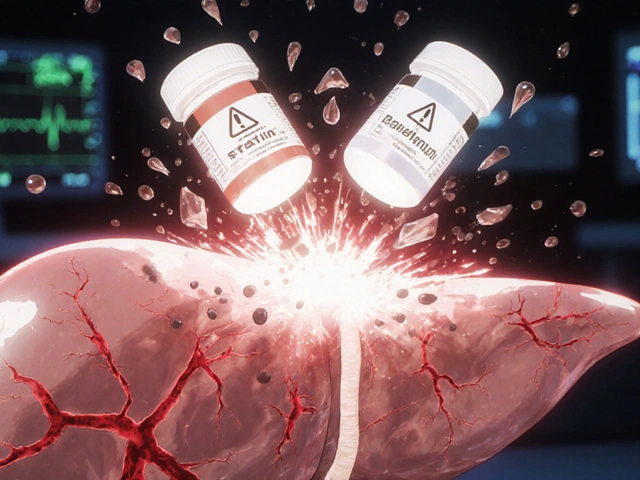Understanding Left Ventricular Dysfunction
As a blogger, I often come across various health-related topics that spark my interest. Today, I will be discussing the importance of early detection and treatment of left ventricular dysfunction. I believe that understanding this condition is crucial for maintaining our heart health, as it can lead to severe consequences if left untreated. So, let's dive into the topic and learn more about left ventricular dysfunction.
Identifying the Symptoms and Causes
First and foremost, it is essential to recognize the symptoms and causes of left ventricular dysfunction. This condition occurs when the left ventricle of the heart, which is responsible for pumping oxygen-rich blood to the rest of the body, becomes weak or stiff. As a result, the heart cannot pump blood efficiently, leading to various symptoms such as fatigue, shortness of breath, and swelling in the legs, ankles, or feet. The causes of left ventricular dysfunction can be diverse, ranging from high blood pressure and coronary artery disease to genetic factors and viral infections. Being aware of these symptoms and causes can help us take preventive measures and seek medical attention when needed.
Importance of Early Detection
Now that we know the symptoms and causes of left ventricular dysfunction, let us discuss the importance of early detection. Detecting this condition in its early stages is crucial, as it can help prevent further damage to the heart and reduce the risk of heart failure. Early detection can be achieved through regular check-ups, maintaining a healthy lifestyle, and paying close attention to any changes in our body. If you experience any of the mentioned symptoms or have a family history of heart disease, it is essential to consult your doctor and discuss the possibility of left ventricular dysfunction.
Available Diagnostic Tests
There are several diagnostic tests available to identify left ventricular dysfunction. These tests include echocardiograms, which use sound waves to create images of the heart; electrocardiograms, which measure the heart's electrical activity; and blood tests that check for specific markers of heart damage. These tests can help your doctor determine the severity of your condition and devise an appropriate treatment plan. It is essential to undergo these tests if you suspect you have left ventricular dysfunction, as early diagnosis can significantly improve your prognosis.
Treatment Options for Left Ventricular Dysfunction
Once you have been diagnosed with left ventricular dysfunction, it is vital to start treatment as soon as possible. The treatment options for this condition may include medications, such as angiotensin-converting enzyme (ACE) inhibitors, beta-blockers, and diuretics, which help manage symptoms and prevent further damage to the heart. In some cases, your doctor might recommend lifestyle changes, such as adopting a heart-healthy diet, exercising regularly, and quitting smoking. In severe cases, surgical procedures like coronary artery bypass grafting or heart valve surgery may be necessary. The key is to work closely with your doctor to develop a personalized treatment plan that addresses your specific needs.
Monitoring and Follow-up Care
It is important to understand that managing left ventricular dysfunction is an ongoing process. Regular monitoring and follow-up care are essential to ensure that your treatment plan is working effectively and to make any necessary adjustments. This might include routine check-ups with your doctor, blood tests, and imaging studies to assess your heart's function. Additionally, it is crucial to maintain a healthy lifestyle and keep track of any changes in your symptoms, as these could indicate a need for adjustments in your treatment plan.
The Impact of Early Treatment on Quality of Life
Finally, it is worth mentioning the impact of early detection and treatment of left ventricular dysfunction on our quality of life. By addressing this condition in its early stages, we can reduce the risk of heart failure, hospitalization, and other severe complications. This not only improves our overall health but also allows us to lead more active and fulfilling lives. So, it is crucial to prioritize our heart health and take the necessary steps to ensure that we are doing everything we can to prevent and manage left ventricular dysfunction.







Comments
I appreciate the thorough overview, but the post glosses over the nuances of differentiating systolic from diastolic dysfunction, which is essential for accurate diagnosis. A more precise delineation of the hemodynamic parameters would benefit readers seeking depth. Additionally, the recommendation to undergo routine echocardiograms should be balanced against cost-effectiveness for low‑risk individuals. While the tone is encouraging, the lack of citation undermines the credibility of the assertions. Overall, the piece could be tightened with stricter adherence to clinical guidelines.
Ah, the melodious symphony of cardiac prose! One cannot help but be swept away by the lyrical cadence that drifts across the page like a soft‑swan glide over a moonlit lake. Yet, beneath the veneer of poetic elegance lies a tapestry woven with threads of clinical insight that demand our unflinching attention. The author, in their boundless generosity, gifts us a panorama of left ventricular dysfunction that is both expansive and inviting, beckoning the neophyte and the seasoned cardiologist alike. Indeed, the exposition of symptoms-fatigue, dyspnea, peripheral edema-unfolds with a measured grace, each term presented as a delicate brushstroke upon the canvas of human experience. Moreover, the discussion of etiological factors-hypertension, coronary artery disease, genetic predispositions-emerges not as a mere list, but as a chorus of causality, resonating within the very chambers of our understanding. The importance of early detection is extolled with the fervor of a troubadour proclaiming a love that must be seized before the night wanes, and the author rightly emphasizes routine check‑ups, lifestyle vigilance, and family history as the trinity of vigilance. In the realm of diagnostics, the cavalcade of echocardiograms, electrocardiograms, and biomarker panels is presented as a veritable banquet, each test a distinct delicacy promising insight into the heart's secret whispers. Treatment options cascade like a waterfall of promise: ACE inhibitors, beta‑blockers, diuretics, each named with reverent awe, accompanied by the clarion call for lifestyle modification that reads like a manifesto for cardiac renaissance. The author’s insistence on individualized care, collaborative dialogue with physicians, and the careful calibration of pharmacologic regimens underscores a profound respect for patient autonomy. Furthermore, the narrative does not shy away from the specter of surgical intervention, reminding us that in the gravest of circumstances, the scalpel itself may become an instrument of salvation. The subsequent discourse on monitoring and follow‑up care is a reminder that the journey does not end with a prescription; it is an ongoing pilgrimage, a marathon where perseverance and vigilance are the twin pillars of success. And finally, the poignant reflection on quality of life-how early intervention can transform the ordinary cadence of existence into a vibrant tapestry of activity and fulfillment-serves as the crescendo of this opus, leaving the reader breathless with hope. In summation, this article stands not merely as an informational treatise but as a work of art, a harmonious blend of science and soul, urging us all to listen to the quiet murmurs of our own hearts before they become a deafening silence.
Wow, that was a ride! Super solid info, and I love how you broke down the tests. If you can, keep moving, stay active, and stick to that heart‑healthy diet – it really makes a difference. Remember, consistency is key, so keep those check‑ups on schedule.
The piece does a great job of highlighting why catching left ventricular issues early matters so much. I’m curious about how lifestyle tweaks like daily walks or Mediterranean meals play into the overall prognosis. It’s inspiring to see that even small changes can shift outcomes dramatically. Also, staying informed about your own symptoms can empower you to seek help sooner. Keep sharing info like this – it helps us all stay motivated and proactive.
While the article provides a comprehensive overview, it lacks rigorous citation of current guidelines, which diminishes its authority. The recommendations for routine echocardiographic screening should be contextualized within risk stratification frameworks. Moreover, the tone, though well‑intentioned, borders on oversimplification, potentially misleading lay readers about the complexity of therapeutic decisions. A more formal structure with referenced evidence would markedly improve the content’s credibility.
Seriously, this whole early detection hype feels like a marketing ploy. Who decides when we’re ‘at risk’? It’s all just fear‑mongering to keep the medical industry rolling. I prefer not to get bombarded with endless tests unless there’s a clear, immediate need.
I think all this fuss about early detection is just alarmist propaganda.